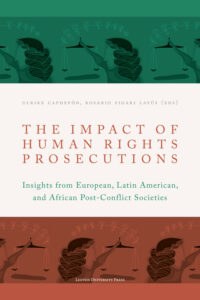New book: The Impact of Human Rights Prosecution. Insights from European, Latin American, and African Post-Conflict Societies
The anthology analyzes from an interdisciplinary perspective the effects and consequences of the prosecution of serious human rights violations in different countries and regions of the world at the social, political, and legal levels.
Human rights prosecutions are the most prominent mechanisms that victims demand to obtain accountability. Dealing with a legacy of gross human rights violations presents opportunities to enhance the right to justice and promote a more equal application of criminal law, a fundamental condition for a more substantive democracy in societies. This book seeks to analyse the impact, advances, and difficulties of prosecuting perpetrators of mass atrocities at national and international levels. What role does criminal justice play in redressing victims’ wrongs, guaranteeing the non-repetition of mass atrocities, and attempting to overcome the damage caused by systematic human rights violations? This volume addresses critical issues in the field of human rights prosecution by drawing on the experiences of a variety of post-conflict and authoritarian countries covering three world regions. Contributing authors cover prosecutions in post-Nazi Germany, post-Communist Romania, and transnational legal complaints by victims of the Franco dictatorship, as well as domestic and third-country prosecutions for human rights violations in the pioneering South American countries of Argentina, Chile, Peru, and Uruguay, prosecutions in Darfur and Kenya, and the work of the International Criminal Court.
The Impact of Human Rights Prosecutions offers insights into the difficulties human rights trials face in different contexts and regions, and also illustrates the development of these legal procedures over time. The volume will be of interest to human rights scholars as well as legal practitioners, participants, justice system actors, and policy makers.
Authors:
- Rosario Figari Layús is postdoctoral researcher in social sciences and lecturer at the Chair for Peace Studies at the Law Faculty at the Justus Liebig University of Giessen.
- Ulrike Capdepón holds a PhD in political science and is a researcher and project coordinator at the Center for Cultural Inquiry (ZKF), University of Konstanz.

